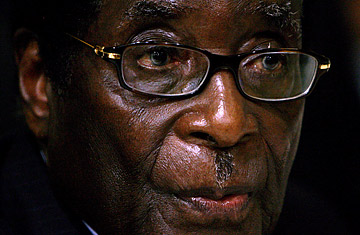
Zimbabwean President Robert Mugabe
Where once he thundered defiantly at the West, Zimbabwe's President Robert Mugabe on Thursday changed his tone, pleading for international help to restart his country's moribund economy — and clearly hoping that the power sharing government he established with the opposition will soften Western hearts. "Please come to our aid," said Mugabe, announcing the unity government's Short Term Emergency Recovery Plan (STERP). "To the European Union and the United States, I appeal for the removal of your sanctions which are inhuman, cruel and unwarranted," Mugabe said. "SADC [the Southern African Development Community] and the African Union have, in support of our inclusive government's economic stabilization and recovery efforts, already strongly called for the removal of these sanctions. We thus repeat our loud call for their immediate removal."
STERP is the first major initiative of the unity government inaugurated last month, in which Mugabe's Zanu-PF party shares power with the erstwhile opposition Movement for Democratic Change (MDC). The economic plan was jointly presented by the President and by Finance Minister Tendai Biti, of the MDC, who said its goal was to raise production in Zimbabwe's factories, most of which are standing idle, to 60% of capacity. (See pictures of political tension in Zimbabwe)
Zimbabweans have been encouraged by Mugabe's new, more conciliatory tone, and by his appearance at the hospital bedside of MDC leader and prime minister Morgan Tsvangirai after the road accident that killed Tsvangirai's wife, Susan. Still, many remain wary of a President who has repeatedly unleashed waves of violence and repression in order to stay in power. And that skepticism will be shared by many in the international community.
Convincing the outside world to come to Zimbabwe's aid while its government included Mugabe would take more than conciliatory words, said Leonard Makombe, a political commentator and University of Zimbabwe lecturer. "The West would want to see significant changes, especially on issues of human rights abuses," he said. "The West does not have much money to splash around because of the economic crunch. Plus, they think Mugabe was responsible for the current state of the economy. They still want to wait and see." Still, he noted, the speech marked "a capitulation" by Mugabe. "He is like patient who shut the door on his doctor and who has suddenly realized that the doctor is the only one who can assist, said Makombe. "Mugabe has realized that the Third World countries that he was depending on have their own problems."
Makombe's sentiments were echoed by Eric Bloch, an accountant and prominent newspaper commentator based in Bulawayo. "Mugabe is trying to reconcile with the international community," Bloch said, "but the international community wants to see significant change." The world remained "very skeptical, because of the prolonged detention of people without going to trial ... and a fresh wave of farm evictions in the last few weeks."
Earlier on Thursday, a visiting Danish minister had said Zimbabwe must restore the rule of law and stop the farm invasions if aid was to be forthcoming. After meeting Biti and lands minister Herbert Murerwa, Denmark's Minister of Cooperation Development, Ulla Tornaes, said the world was trying to find ways to support Zimbabwe, but "the evictions of farmers from their land and the invasion of land without compensation is unacceptable. The rule of law must be restored."
